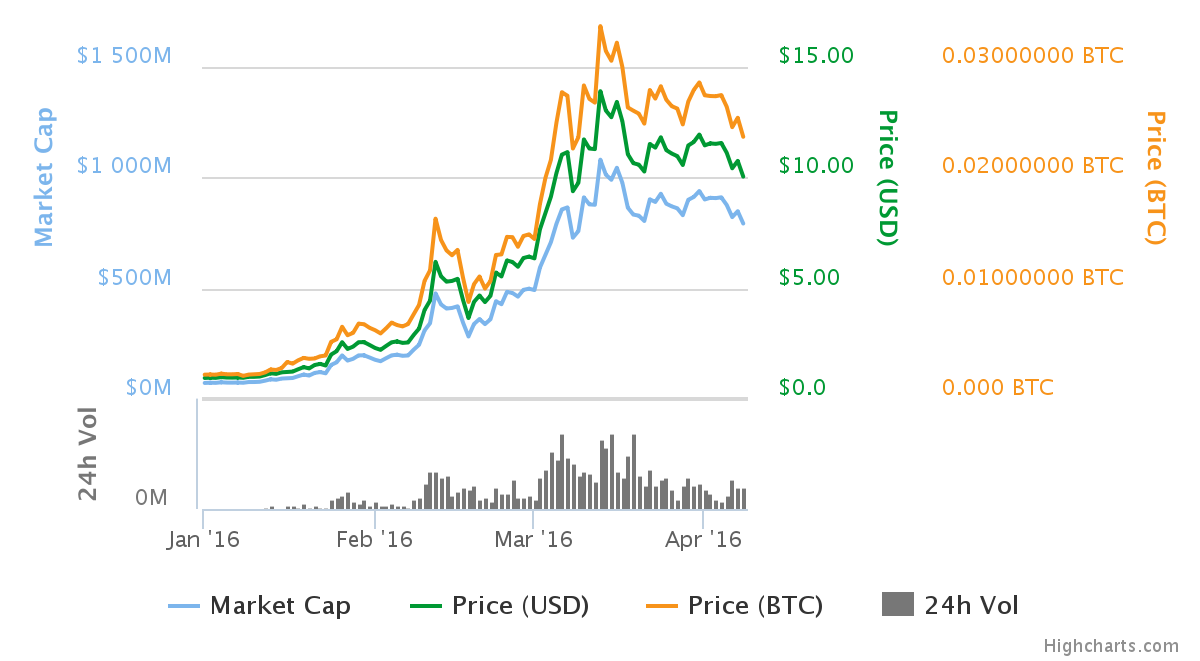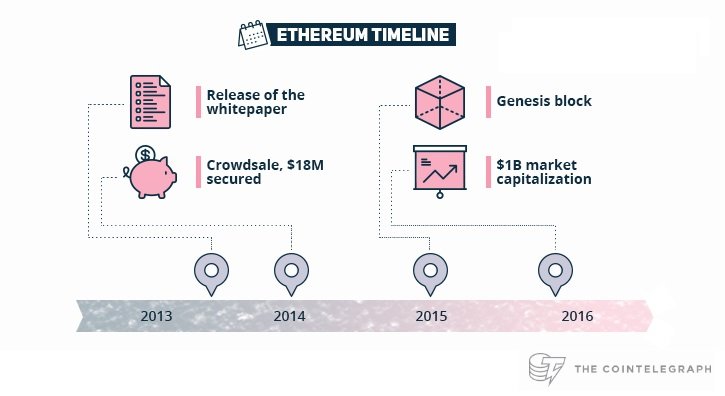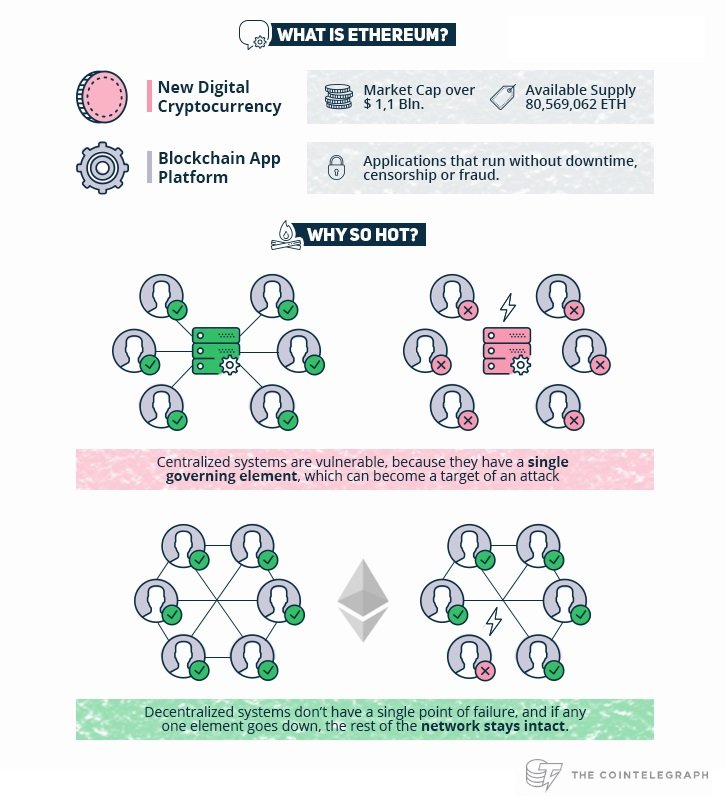Ethereum is a platform for creation of decentralized applications running on blockchain, through the use of smart contracts.Since its launch on , it has been steadily Starting from late January 2016, it has experienced a surge.In March 2016, within less than a year of its existence, that growth culminated in Ethereum achieving a record-breaking market capitalization of.Since then, the passions have subsided and Ethereum has declined a bit. However, the coin is now second only to Bitcoin on the cryptocurrency market capitalization list.
Ethereum Charts

- The graphical representation of how Ethereum has been killing itBitcoin has undergone a similar explosion of growth in the late 2013 - early 2014, when its price has reached its. Launches of several of different kinds of alternative cryptocurrencies followed.Some of those altcoins have managed to reach a certain degree of success, but none of them have achieved the heights of Ethereum.The platform has even enjoyed Microsoft’s attention, when it the launch of Ethereum Blockchain as a Service (EBaaS) based on the Microsoft Azure platform back in November 2015.Now the reader might be wondering: why did all of that happen?

Why is Ethereum so hot?
Well here’s the short version: Ethereum is decentralized, like Bitcoin, but is capable of much, much more.The way Bitcoin’s peer-to-peer network is decentralized and distributed, where every participant is a client and a server at the same time, allows for unprecedented increase in that network’s security and resilience.In legacy systems, where the entire network is handled by a single server entity, it becomes a weak point, which may be exploited by potential attackers.On the other hand, decentralized networks are:
- Very resistant towards hacker attacks;
- Have zero downtime, even if some of their parts go down;
- Are not run by specific, limited number of people (having people in charge can cause additional problems, both intentionally and unintentionally, due to the notorious human factor).
In addition to all those characteristics, one of the most important features of blockchain and, by extension, Bitcoin is the integrity of data.Records of every transaction ever made in the Bitcoin network can be accessed by anyone, are easily traceable to the pseudonyms of the sender and receiver (but not to their real-life identities), and are virtually unalterable.Thus, nobody can trick each other, by, for example, spending the coins which they don’t actually have.
Here’s a short video about how Bitcoin works, in case you’ve been living under a rock for the past several yearsThese advantages are very important for a payment protocol, but some developers have quickly realized that that utility doesn’t end with one simple use case.Basically, any area, where you need to keep a registry of some data, can be made more secure and efficient with the blockchain:
- Domain names;
- Ownership records;
- Business contracts, etc.

The problem
So far, the developers tried to produce new apps based on the blockchain in two distinct ways, both of which have been ultimately ineffective.The first option was to build an app on top of Bitcoin. However, Bitcoin’s script , i.e. it cannot solve the problems that are easily solvable by some known programming languages, such as C++, for example.That is associated with technical complications and requires a developer to introduce all kinds of “crutches” to make it work.Other option was to develop, launch and promote you own alternative blockchain, thus depriving yourself of the opportunity to use the of the whole Bitcoin’s network.Instead, you will have to run your own blockchain, which is associated with high costs, that can not be justified for every app.
The solution
Ethereum has for the first time ever, by integrating a proper, all-purpose programming language with its own blockchain.With it, anybody can think of any possible application, easily code it and offer the ETH network to execute it.Quite simply put, Ethereum is a worldwide distributed decentralized with a theoretically unlimited power.A developer codes a solution and deploys it in the network. Then the network executes it by itself, verifies the outputs by itself and distributes value between the participants by itself.The applications run in an absolutely transparent manner, without any input from central authorities, achieved with the help o The cherry on the cake is that the network’s power is only limited by the number and power of the computers, which are connected to it, i.e. it isn’t: keep in mind, that there are no barriers to entry.
- Vitalik Buterin, the founder and one of the principal developers of Ethereum, explains what Ethereum is
The World Computer
The potential uses of such a system are truly unlimited.One of the more obvious options is creating a new cryptocurrency in just a couple dozen lines of code, and immediately launching it on Ethereum’s blockchain;For that matter, any possible asset, such as a car, or a house, can be represented, and consequently traded on a blockchain in the form of a token.More complex solutions include disintermediating (and eliminating the middleman fees in the process) some of the existing marketplaces, such as Facebook Advertising and Google AdWords.That could be achieved by creating the smart contract counterparts of all the business processes which comprise those companies, and - you guessed it - running them on the blockchain.Another potential use for Ethereum is coding solutions for complex scientific tasks, such as distributed or for pharmaceutical companies.Such applications would enjoy the theoretically unlimited computational power of the network, unattainable by even the most advanced supercomputers.Even completely revolutionary, never before thought about projects, are made possible, one such example being .It is a “Decentralized Prediction Market”, theoretically capable of delivering predictions with a higher degree of accuracy, than that of the best experts in any particular field (achieved through the use of the “” principle).
- With Augur you don’t have to worry about how correct are the answers, just ask the right questions
The future of Ethereum
Considering everything that was mentioned so far, the reasons for Ethereum to be in the spotlight right now should be quite obvious.And although at this point it’s highly unlikely for the coin to ever fade into obscurity, the speed and scope of its future growth will depend on many factors.Yes, Ethereum gives the promise of unlimited opportunities. But whether that promise is going to be fulfilled, and to what extent, depends on how powerful the network will become, and how talented and creative will the developers of particular solutions be.
Experts’ opinions
To help you better understand what Ethereum is, we have decided to ask several experts in the field the following question: “ELI5: What is Ethereum?”
“Ethereum is the second Blockchain to pass a billion dollars of market capitalisation and deploy a secure amount of mining power. Like Bitcoin it is decentralised, but unlike Bitcoin it is not used as a currency as its supply of digital tokens (Ether) is not fixed. This is by design as Ether is used for creating smart contracts rather than as a currency.In a world where corporation are all interested in Blockchains, Ethereum has become a decentralised Blockchain that they are more comfortable to use, even though Bitcoin is a lot more secure and has a longer history right now. When corporations realise that private Blockchains do not have much value they will be able to choose between Ethereum and Bitcoin (whose economics work very differently) to secure smart contracts.”- , CEO BnkToTheFuture.com and Fund Manager Bitcoin Capital
"Ethereum relates to blockchains like java relates to relational databases: you store your data in the database and build your application in java. One of the key differences is that Blockchains and the ethereum platform are not running on one but several distributed servers. They offer some unique features like for example the fact that transactions in a blockchain cannot be reverted, whereas all databases offer transactions handling and rollback mechanisms."-
In near future, CoinTelegraph will continue this series with the following chapters:
- The way the idea of Ethereum was born;
- How the smart contracts - the basic building block of its apps - work;
- How can you become a part of the ETH network, which solutions have already been implemented based on it, and what does future hold for it.
Stay tuned! source>https://cointelegraph.com/ethereum-for-beginners/what-is-ethereum



